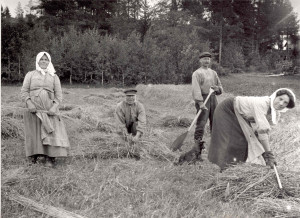This Position Paper draws together the emerging evidence that the early life experience of parents and/or ancestors can influence development and common disease risk in the current generation, with the aim of promoting human transgenerational research . The few human observational studies reported to date of the effects of ancestral exposures (such as nutrition or smoking) support transgenerational effects that cannot easily be attributed to cultural and/or genetic inheritance. This points to non-genetic biological inheritance in humans similar to that convincingly demonstrated in transgenerational animal experiments, particularly involving altered nutritional or stress exposures. The authors argue that transgenerational responses to specific exposures in previous generations should be factored into future studies with a public health focus. (By Dr Richard Saffery, http://jmg.bmj.com/content/early/2014/07/25/jmedgenet-2014-102577 )
Harvest in northern Sweden a hundred years ago (© the Demographic Database, Umeå University)
